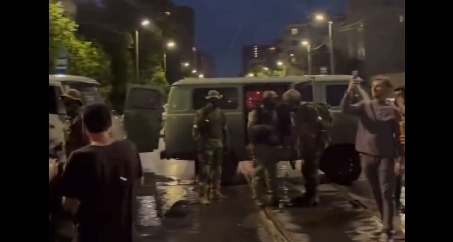Yevgeny Prigozhin, the Wagner Group’s head, declared on Saturday that his armed forces had decided to withdraw in order to avoid any bloodshed. This change signaled a de-escalation of the circumstance, which had posed a serious threat to President Vladimir Putin’s authority.
Also read | What will happen to Yevgeny Prigozhin’s men after Wagner Group turns back ‘to avoid bloodshed’
Following the Wagner Group’s de-escalation declaration, a number of Russian citizens who had shown their support for the organization came out and interacted with Yevgeny Prigozhin and the soldiers. On social media platforms, a number of video clips capturing these instances began to circulate.
Prigozhin and the Wagner Group began to receive a sizable amount of support from those who are against Putin’s government as the soldiers started to leave the city. Crowds of people could be heard chanting “Wagner, Wagner, Wagner” in the streets of Rostov. This development shows that a solution is still a long way off.
Also read | Yevgeny Prigozhin to move to Belarus as part of deal to end Wagner uprising
Several Twitter users shared their opinions and reactions to the surfaced clips. One user tweeted, “Wagner went in and told them the truth about Ukraine. The truth about what’s happening to Russian soldiers etc. No doubt pics and films were shown to some via cellphones. Word will get around now. It’s not over.”
“The Russian people got to talk to these mercenary soldiers all day and hear what was really happening in Ukraine. This is definitely far from over”, another user tweeted.
The forces of the Wagner private army, which is under the operation of Yevgeny Prigozhin, made significant advances towards Moscow. They successfully captured the city of Rostov and embarked on an ambitious 680-mile journey toward the capital Moscow.
Also read | Who is Sergei Shoigu and Valery Gerasimov, key figures in the Russian Ministry of Defense?
Yevgeny Prigozhin stated in an audio message on Saturday that the soldiers had opted to withdraw after advancing near Moscow in order to stop any bloodshed. According to his administration, Belarusian President Alexander Lukashenko negotiated the decision to stop traveling further via Russia and obtained assurances for their safety.







